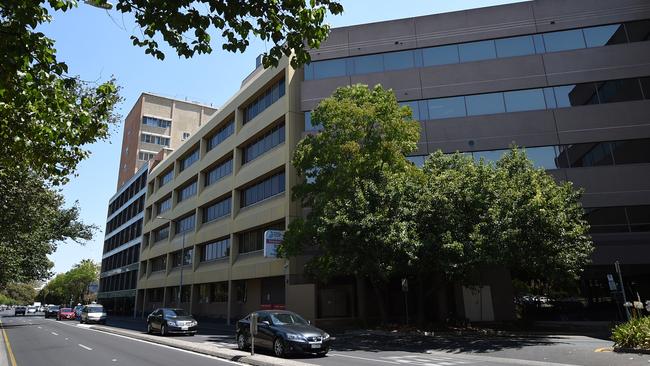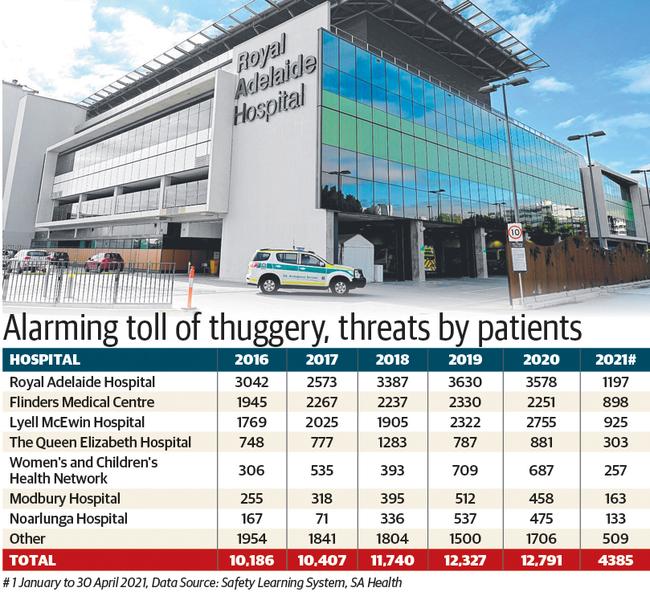Violent, threatening and intimidating incidents occur 36 times per day across SA hospitals
Violence in SA hospitals is on the rise, with nurses and doctors experiencing an average of more than 36 incidents a day – including spitting, choking and biting.
SA News
Don't miss out on the headlines from SA News. Followed categories will be added to My News.
Violent and threatening incidents in the state’s hospitals are rising as staff call for urgent help to deal with dangerous patients at a rate of about 36 times per day.
The number of “code black” incidents increased by more than 25 per cent across the state’s hospitals from 10,186 in 2016 to 12,791 last year.
Peak medical bodies say the Covid-19 pandemic is causing people to suffer more mental health episodes, some of which turn violent.
They also say the surge in code blacks is a symptom of an overflowing health system, warning violent incidents will continue to rise and place more pressure on already stressed hospital workers.
The SA Health figures show 4385 incidents occurred in the first four months of this year at an average rate of 36.5 per day.
If that rate continues, more than 13,000 incidents could be recorded this year. The number of code blacks at the Women’s and Children’s Hospital more than doubled over the past five years, up from 306 in 2016 to 687 last year.
In the first four months of 2021, there were 257 code black calls at the hospital – more than two per day.

Code black calls are requests for urgent or emergency help by medical staff who perceive their safety, or that of another, is at risk due to incidents of violence, threats or intimidating behaviour. They are also used as a preventive measure.
More than a quarter of all code black incidents were reported at the Royal Adelaide Hospital.
Australian Medical Association state president Dr Michelle Atchison said the pandemic was causing an increase in stress, anxiousness and suicidal thoughts among the community.
“There are more presentations in the emergency departments and more with mental health due to Covid-19,” Dr Atchison said.
She said people experiencing increased stress often turned to drugs and alcohol, which could further exacerbate agitation and distress in hospital waiting rooms and lead to violent incidents.
Dr Atchison said seeing patients sooner “would de-escalate a lot of the distress”.

Australian Nursing and Midwifery Federation SA Branch chief executive officer Elizabeth Dabars said the fear among nursing staff was “palpable”.
“We are getting reports every day about people who’ve been punched, choked, spat at, bitten, had hair literally ripped from their scalps, even threatened with bowel movements,” she said. “We have seen some terrifying incidents in our hospitals, some of which we were lucky there wasn’t a fatality.”
Associate Professor Dabars said staff exposed to violent incidents suffered both physically and mentally, causing some to quit their jobs. She said the “crushing demand” on the state’s hospitals was a key cause of the increase in violence being reported, with clogged emergency departments leaving patients waiting for “arduously long” periods.
“We also have reports of increases in mental health intakes, patients housed sometimes for days in emergency departments which, by their high-stimulus 24/7 nature, are totally inappropriate environments for people with mental health care needs, resulting in violent, threatening outbursts,” she said.
She said an increase in mental health beds and an immediate injection of an extra 30 to 40 mental health nurses were required to cover the existing workforce shortfall alone.
Australian Institute of Health and Welfare figures show one in 10 mental health patients in SA wait almost 28 hours in emergency departments to be admitted, while the average wait is almost seven hours.
In April, outgoing Central Adelaide Local Health Network mental health and prison services director Adjunct Professor John Mendoza said there had been an almost 40 per cent increase in mental health emergency department presentations at the RAH in February, compared with two years prior.
Earlier this month, two patients waited more than 90 hours for a mental health bed.
South Australian Salaried Medical Officers Association chief industrial officer Bernadette Mulholland said the figures were “distressing but not surprising”.
“Clinicians are committed to providing care to their patients. But in an environment of insufficient resources, crowded emergency departments and daily risk to their safety, this is not currently an easy task,” she said.
“The increase in unwell patients making threats to harm themselves or those trying to provide care is very real and can be very frightening.”
In a statement, a spokeswoman for SA Health said any act of violence or aggression in hospital was “not acceptable” and that “the safety of our staff is our priority”.
She said the rise in incidents could be explained by a push for increased reporting.
“Everyone has the right to be safe in their workplace and we are committed to providing a safe environment for staff, patients and their families,” she said.
She said staff were trained in dealing with patients who displayed challenging behaviour. A range of initiatives to support staff in preventing, recognising and managing challenging behaviour had also been recently implemented, she said.
More Coverage
Read related topics:SA Health




